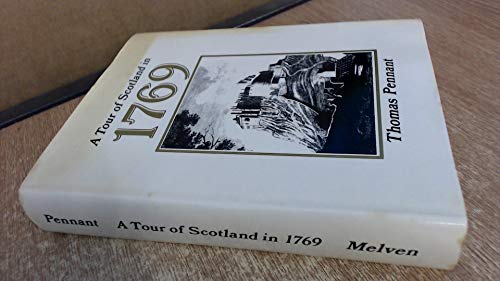tour scotland 1769 von pennant thomas (3 Ergebnisse)
Produktart
- Alle Produktarten
- Bücher (3)
- Magazine & Zeitschriften
- Comics
- Noten
- Kunst, Grafik & Poster
- Fotografien
- Karten
-
Manuskripte &
Papierantiquitäten
Zustand
Einband
Weitere Eigenschaften
- Erstausgabe
- Signiert
- Schutzumschlag (1)
- Angebotsfoto (1)
Land des Verkäufers
Verkäuferbewertung
-
A Tour of Scotland in 1769.
Verlag: Perth: Melven, 1979
ISBN 10: 0950588490ISBN 13: 9780950588490
Anbieter: Plurabelle Books Ltd, Cambridge, Vereinigtes Königreich
Verbandsmitglied: GIAQ
Buch
Hardcover. Zustand: Very Good. 388p hardback, facsimile text and plates, dustjacket in good overall condition, clean pages, firm binding, a nice copy Language: English.
-
A Tour in Scotland, 1769
Verlag: LIGHTNING SOURCE INC, 2021
ISBN 10: 1014432499ISBN 13: 9781014432490
Anbieter: moluna, Greven, Deutschland
Buch
Zustand: New.
-
A Tour in Scotland 1769 [with] A Tour in Scotland and Voyage to the Hebrides 1772.
Verlag: W. Eyres (vol. 1) and Chester, John Monk (vol. 2), Warrington, 1774
Anbieter: Hordern House Rare Books, Surry Hills, NSW, Australien
Two volumes, quarto; engraved frontispieces and numerous plates, original eighteenth century sprinkled calf with handsome nineteenth century spines; double leather labels and panelled in gilt between raised bands. A good set of Pennant's account of his travels in the north. The first volume is in its third edition, while the second volume is in the preferred second edition, the only version to include Joseph Banks' account of Staffa and Fingal's Cave. Pennant visited Scotland in 1769, his "Tour in Scotland" appearing for the first time in 1771. When Banks set out for Iceland in 1772, first travelling to the Scottish isles, he was conscious of the fact that Pennant, on his second tour of Scotland, was also travelling in the Hebrides. Feeling that Pennant had a prior claim to that region, he wrote: "I believe that we passed the Ship of our friend Mr. Pennant which I had all along carefully looked out for not without hopes if I should be fortunate enough to meet him of tempting [him] to enlarge his plan & wishing much to spare him at all events that as I had looked upon myself while among these Islands as treading upon ground which by prior right he has taken possession of I should communicate to him every Observation I could possibly make whenever he thought fit to publish any account of them". During his voyage to Iceland, Banks "discovered" the island of Staffa, one of the Hebrides, which Pennant could not visit on his tour. Pennant included in his travelogue the account of Staffa which Banks had given him. He dedicated the book to Banks, thanking him for "the liberal declaration.that the Hebrides were [Pennant's] ground". When Banks was elected as president of the Royal Society in 1778, it was with Pennant's influential support. Banks's account of Staffa (vol. 2 pp. 261-71) includes his famous description of Fingal's Cave, with three accompanying engravings of the geological phenomenon. These, like most of the prolific engravings in the work, were after drawings by Pennant's personal artist, Moses Griffith, who travelled with him., Thomas Pennant, born in 1726, was a prominent ornithologist and zoologist and prolific author of the eighteenth century. His writings about natural history, topography and travel were based on his many tours of the British Isles and research into the world's animal kingdom. It was said that his writings achieved great success by always making dull scientific matters interesting. Samuel Johnson spoke of him as "the best traveller I ever read, he observes more things than anyone else does". His circle of friends included Captain Cook as well as Banks; in 1771 he visited Banks shortly after he returned from his voyage around the world on the Endeavour, and took away with him some of the specimens that Banks had bought back from the voyage, which he would later write about. The origin of the name Pennant Hills in the Cumberland area has long been debated. In recent times it has been argued that it was named after Thomas Pennant who, apart from being an associate of Banks, was a member of the Royal Society and known to senior people in the infant colony, including Francis Grose the lieutenant-governor. . Slight wear at top of spines; a few creases and repaired tears but in very good condition.




